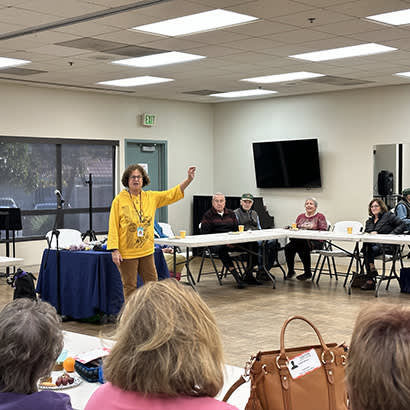
For an enhanced digital experience, read this story in the ezine.
Imagine a large room at a community center that’s filled with adults ranging from 55 to 98 years old laughing, socializing, drinking coffee and enjoying refreshments. Upbeat music plays, and the mood is light and playful. This describes the atmosphere at my Happiness and Humor group at the Alpert Jewish Community Center (JCC) in Long Beach, California.
For more than 16 years, I have facilitated this group — which was developed following my research at local senior centers. My inspiration came from the results of the study that determined loneliness to be the main factor of unhappiness in older adults.
While the doors open at 10 a.m. for coffee and socializing, the magic happens long before I begin to facilitate the group at 10:30 a.m. I feel the positive energy and see the bonds that develop during the months — and even years — participants attend the group. I see happiness and humor alumni greeting and welcoming new attendees. As the participants top off their coffee cups and take one more cookie before finding their seats, I begin by requesting: “State a problem you don’t have.” This often brings a laugh and breaks the ice for the newcomers.
Each month, I prepare 20 minutes of “happiness education.” The topics range from how to make friends to managing stress. I use interactive techniques, such as role-playing or small group discussions, to brainstorm and problem solve. I throw in a joke or two to provide levity, and I also enjoy using props, such as kazoos, to teach participants to play and be silly.
The topics appear light and are presented in a fun manner, but the messages often resonate with participants. Many will come to me months later and say that they tried one of the techniques discussed in the group and describe how it helped them make a friend or talk more effectively with family members.
After the happiness education and discussion it promotes, I play one of my favorite irresistible, feel-good songs, like “Single Ladies (Put a Ring on It)” by Beyoncé, or “Get on Your Feet” by Gloria Estefan. I remind them of the benefits of movement and letting go of their worries by doing something as simple as listening to their favorite songs and dancing.
During the last 15 minutes, I hand out gratitude and happiness quotes for participants to take home. Many tell me they display them on the refrigerator or nightstand. I also like to offer resources for local farmers markets, discounted events in the area, and other meaningful programs offered at the Alpert JCC or in community centers in nearby cities.
The ultimate goal of the group is to provide opportunities for participants to make friends, feel purposeful, and use what they’ve learned to make their lives happier.
Dr. Susan Mathieu, is Adjunct Faculty at Jewish Long Beach and Alpert Jewish Community Center.

